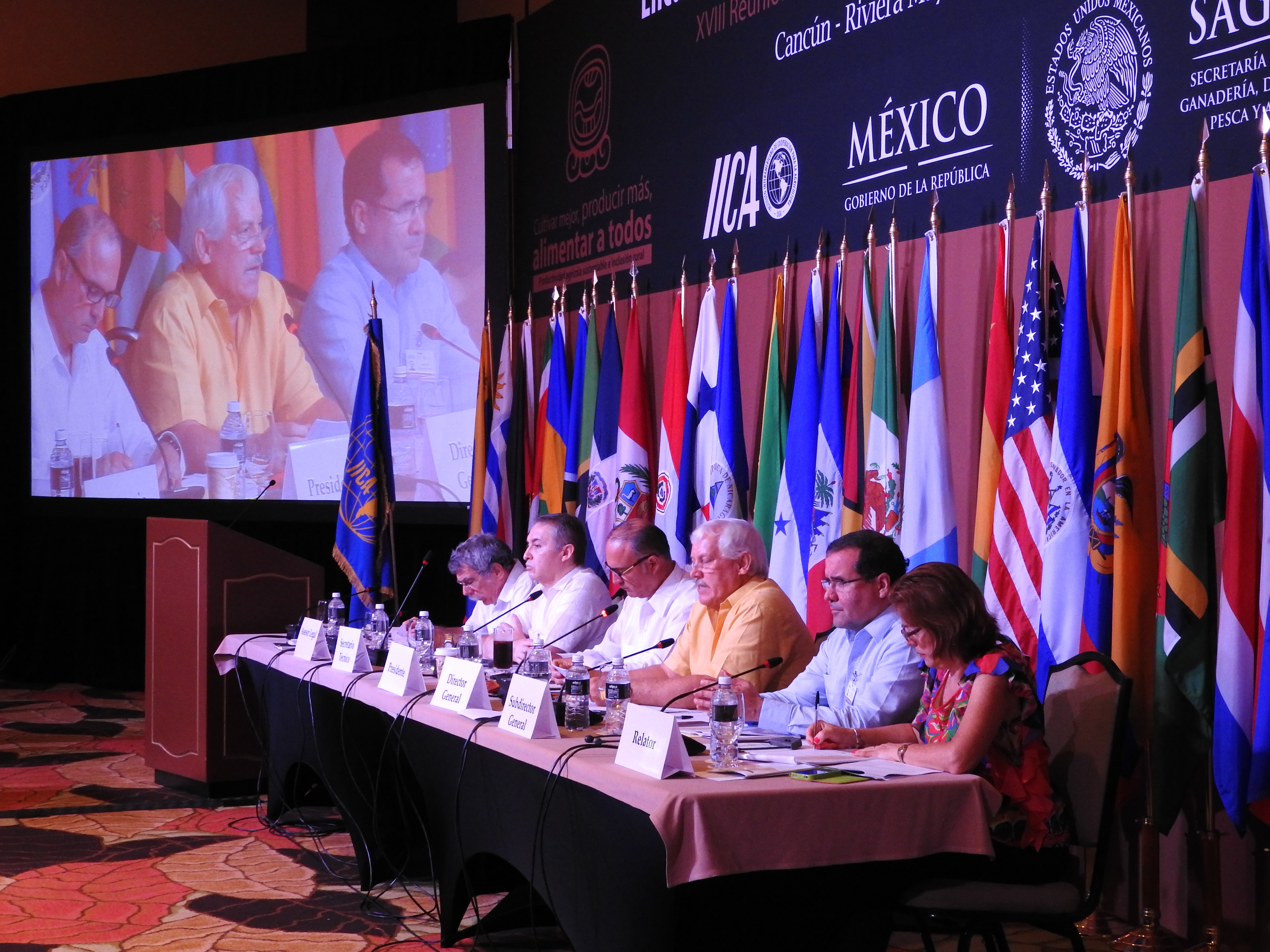This Thursday, the Director General of IICA gave a presentation to the ministers of agriculture of the Americas in which he outlined his organization’s main achievements during the period 2014-2015.

Cancun, 22 October 2015 (IICA). The Inter-American Institute for Cooperation on Agriculture (IICA) is spearheading 204 impactful initiatives on behalf of the agricultural sector of the Americas, a fact cited today as eloquent proof of the organization’s commitment to the sector’s development.
The Director General of the international organization, Víctor M. Villalobos, made the statement in presenting the main results of the Institute’s technical cooperation over the past year to the Eighteenth Regular Meeting of the Inter-American Board of Agriculture (IABA), which is taking place in Cancun, Mexico.
The initiatives in question are 158 externally funded projects involving financing of USD 116 million, 41 rapid response actions that are enabling IICA to meet emerging needs in the member countries, and 5 inter-American projects executed with the Institute’s own resources. (See infographic of results)
At the meeting, which is being held under the aegis of the Meeting of Ministers of Agriculture 2015, the Director General explained that, under the new cooperation model adopted by IICA in 2014, the institution was progressing toward results-based management, and encouraging, promoting, and supporting agricultural development and rural well-being in the Americas.
“The Institute adds value to the work of governments, academics, the private sector, and civil society in the Americas. Thus, thanks to its level of commitment and the results it achieves, IICA is an important strategic partner of the agricultural sector and a go-to organization for agriculture in the region,” he observed.
The results are related to seven overarching areas of work: family farming, agricultural chains, agricultural health and food safety, inclusive agriculture and area-based management, resilience, efficient water use, and capacity building. The following are some of the specific results achieved:
- 1338 more trained professionals in the agricultural sector, part of the new generation of specialists.
- Over 2400 people with enhanced expertise in communication and biotechnology in Central America, the Dominican Republic, Colombia, Panama, Paraguay, the United States, Peru, and Venezuela.
- 3000 technical officers and other officials in 28 countries of the Americas more knowledgeable about the latest trends in agricultural policy, the challenges that need to be addressed and the opportunities available, based on the experiences of the United States, Brazil, Canada, Chile, and Spain in that area.
- 17 agricultural and forestry innovations being applied as a result of cooperation with the European Union, Canada, the United States, Finland, and the Inter-American Development Bank (IDB).
- 1100 officials and agricultural producers in 23 countries with expertise in the management of chains, businesses and risks, value added, and associative enterprises.
- More than 500 members of public and private entities related to rural development and area-based planning with new knowledge about youth, gender, leadership, and training.
The Institute has served as a fulcrum for management processes in agriculture sector institutions in Belize, Costa Rica, Panama, El Salvador, Jamaica, Bolivia, Peru, Brazil, Chile, Paraguay, and Uruguay, lending support to the design of strategic and operating policies and plans.
Under a program run by Mexico, 522 individuals from the Caribbean, 223 from Central America, and 593 from other regions received training in water conservation, family farming, rural tourism, biotechnology, public policies, adaptation to climate change, and sheep production, among other subjects.
As part of this initiative, the Institute provided follow-up to eleven projects, and promoted the improvement of eight initiatives of Caribbean Community (CARICOM) member countries.
IICA is also spearheading nine multinational projects in various areas, all financed by its own Competitive Fund for Technical Cooperation (FonTC).
“The application of the new technical cooperation tools and the execution of a budget that is more detailed, equitable, and geared to projects and the achievement of results has borne fruit, enabling us to make corporate management more efficient, cut costs and make economies, all of which has helped to improve the delivery of technical cooperation,” Villalobos observed.
“Our aim is to contribute more to the achievement of a more productive and environmentally sustainable agricultural system, contribute to the development of rural territories and poverty alleviation, and guarantee food security,” he concluded.
The IABA will be in session today until 5:15 pm Mexico time, when it is expected to announce the signing of a Ministerial Declaration in which the region’s highest-level agricultural authorities will provide IICA with a mandate for its actions over the next two years.
More information:











